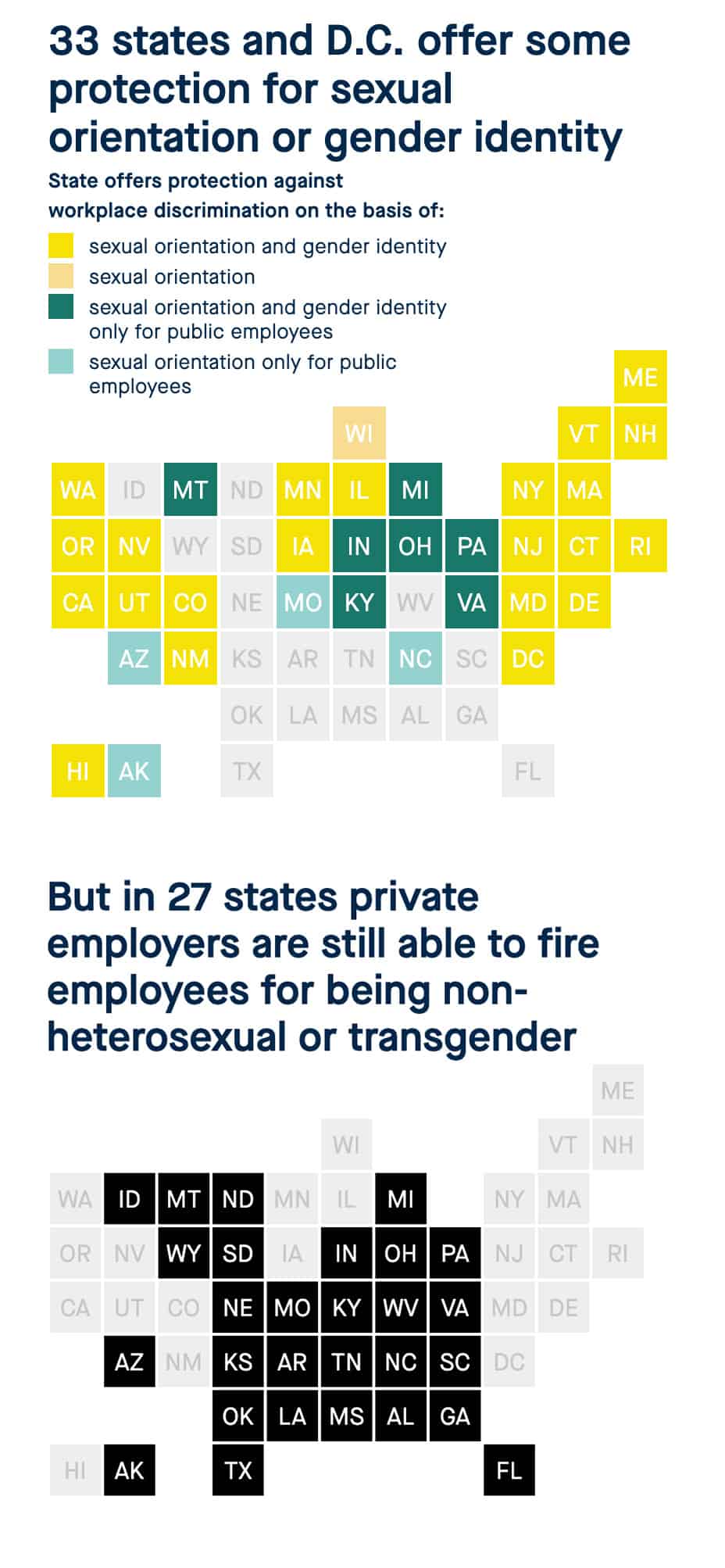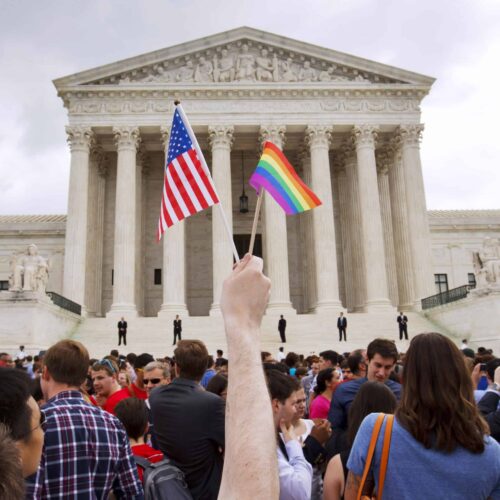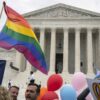This story was published in partnership with the Columbus Dispatch.
Introduction
Updated on June 15, 2020: The Supreme Court ruled that workers cannot be fired for their sexual orientation or gender identity because federal law bans such discrimination. Read about that here. The article below was updated with the death of Aimee Stephens.
While working at a Billings, Montana, auto dealership in 2016, Kathleen O’Donnell said mechanics would frequently sling insults behind her back, calling her “faggot” and referring to her as “Bob” or “Joe” because of her closely cropped hair. A few days before her six-month probationary period at the dealership ended, O’Donnell recalled, her manager, with tears in his eyes, told her he had to fire her because she was gay. It was the first time O’Donnell had been fired from a job.
If O’Donnell had worked just a two-hour drive away in Bozeman, she would have been protected by that city’s ordinance against discrimination based on sexual orientation and gender identity. If she had worked at one of the dozens of Montana companies whose workplace policies bar discrimination, she could have filed a complaint. If she had been one of Montana’s nearly 23,000 state government employees, her job would have been assured by an executive order forbidding discrimination in state agencies.
“[The Montana Department of Labor] told me, ‘You could try to get your own private lawyer,’” O’Donnell said. “As far as state protections, there was nothing they could do.” Managers at the dealership did not respond to requests for comment.
Like O’Donnell, many of the country’s gay, lesbian and transgender employees aren’t protected against discrimination for one simple reason: There is no federal law that definitively prohibits LGBTQ discrimination in the workplace. And the Trump administration is working to roll back protections, proposing a rule this month that would allow federally contracted companies to use religious objections as a reason to discriminate against LGBTQ employees. What is left is a patchwork of differing circuit court opinions, state and local laws, and individual company policies that gay, lesbian and transgender workers say creates confusion, stress and eventually capitulation when they realize they can’t pursue legal remedies.
This fall, the U.S. Supreme Court could guarantee federal legal protections – or rule to continue the status quo. The court is set in October to hear three cases of alleged LGBTQ employment discrimination to determine if the Civil Rights Act of 1964 — which bars employers from discriminating against workers based on race, color, religion, national origin, age, pregnancy, disability or sex — includes sexual orientation and gender expression. If the court rules LGBTQ individuals are not covered, many Americans will continue to face setbacks that can lead to psychological trauma — as, for example, Jimmie Beall says she endured.




There’s no federal law that prohibits LGBTQ discrimination in the workplace. These individuals who say they experienced discrimination at work for their sexual orientation or their gender identity live in states without complete protections for LGBTQ workers.
After teaching high school government for three years in London, Ohio, Beall was fired in 2003. The reason, she said she was told, was that she wasn’t qualified for the job — despite the school board having extended her contract weeks before.
More than a year later, Beall said, she obtained an email from a board member — excerpts of which are referenced in her 2006 discrimination lawsuit against the board — in which the school superintendent alluded to her sexual orientation while raising the idea of terminating her. According to the lawsuit, the superintendent had objected in his email to a lesson Beall taught on gay rights in April 2003. The school board, according to the lawsuit, claimed that its members had proposed letting Beall go several months before the lesson. A judge didn’t buy the argument, however, noting that the board had offered her a contract extension in March. Officials with London City Schools did not respond to requests for comment.
Ohio is one of 28 states that have no workplace protections for LGBTQ employees — unless they work for the state. Beall’s legal battle proved to be expensive and combative, with lawyers questioning her story and her lifestyle. She eventually settled out of court for an undisclosed sum, but the ordeal, she said, caused her anxiety and sleepless nights, an experience she likened to “peeling off your skin.”
“When you [file a complaint], the other side is adversarial,” Beall said. “They’re going to question you and question what you do and why you do it. … You get pounded enough, you start to think, ‘Is it even worth it?’”
A complex legal tangle
Title VII of the Civil Rights Act forbids, among other things, discrimination against workers based on sex. What that means, exactly, will be argued before the Supreme Court: Should it be understood to include sexual orientation and gender identity?
Title VII is filled with legal loopholes and gray areas for individuals other than gay, lesbian and transgender people. Employers can hire people based on “bona fide” qualifications, meaning, for example, that a school can choose to hire people based on their religious beliefs if that school is supported by or shapes its curriculum around a religious institution. Workplaces with fewer than 15 employees are exempt from the law. Federally recognized Native American tribes aren’t subject to the protections. And some of the law’s categories are limited, such as age discrimination. Other categories are left off the list, such as discrimination against employees based on their citizenship status.
The Trump administration on August 23 asked the Supreme Court to declare that Title VII allows for private companies to fire employees based on sexual orientation only. In a brief, the Justice Department argued that the Title VII-protected term “sex” applies only to biological definitions of male or female, not to sexual orientation. The Justice Department also filed a brief on August 16 to the Supreme Court asking it to rule that transgender workplace discrimination should not be protected. In both briefs, the department argued that to interpret sex as encompassing sexual orientation and gender identity would be tantamount to rewriting Title VII, a power only Congress holds.
Some legal scholars have argued employment discrimination based on sexuality or gender identity is inherently tied to an employee’s sex and therefore should be protected under Title VII. Lower courts such as the 6th U.S. Circuit Court of Appeals, which hears cases from Kentucky, Michigan, Ohio and Tennessee, have used this interpretation in their rulings. Other courts have disagreed, ruling that when the Civil Rights Act was passed, Congress did not consider “sex” to include sexual orientation or gender identity, and therefore the terms should not be considered protected from discrimination.

Employee protections against LGBTQ-based discrimination vary from state to state. Twenty-two states and the District of Columbia bar discrimination against all LGBTQ employees, while 11 states only protect state-government employees. If the Supreme Court rules against including sexual orientation and gender identity as protected categories, these state laws would stand. Seventeen states have no protections at all.
A definitive ruling from the U.S. Supreme Court would be a “huge deterrent” against LGBTQ-based employment discrimination, said Elizabeth Kristen, director of the Gender Equity and LGBT Rights program at the nonprofit law firm Legal Aid at Work.
Outside of the courts, LGBTQ employees who believe they were harassed at work or terminated because of their sexual orientation or gender expression can file a complaint with a state civil rights commission, a local LGBTQ advocacy center or the Equal Employment Opportunity Commission.
Still, without documentation or a corroborating witness, a case is difficult to win.
“It can’t be a hunch that you were discriminated against because of your sexual orientation or gender identity,” said Jay Kaplan, an attorney at the Michigan branch of the American Civil Liberties Union. “There has to be some sort of factual proof.”
“It can’t be a hunch that you were discriminated against because of your sexual orientation or gender identity. There has to be some sort of factual proof.”
Jay Kaplan, attorney at the Michigan branch of the American Civil Liberties Union
Kaplan is one of the lawyers who will argue before the Supreme Court in favor of protecting sexual orientation and gender identity under Title VII. He represents Aimee Stephens, a Michigan transgender woman who was fired in 2013 from R.G. & G.R. Harris Funeral Homes Inc. in Detroit, where she had worked for six years as a funeral director and embalmer before transitioning. Before leaving for a vacation in July 2013, Stephens sent a letter to her coworkers and boss informing them that when she returned, she planned to undergo gender reassignment surgery, start to wear clothing designated for female employees in the company handbook and take the name Aimee.
Two weeks later, the funeral home owner, Thomas Rost, fired Stephens, according to her brief to the Supreme Court. Rost cited the lack of explicit protections in Michigan for employees like Stephens in justifying why she was fired, according to the brief. The brief further claims that Rost said he would have kept Stephens employed only if she continued to maintain a male appearance at work. Stephens died in May 2020 from complications of kidney failure.
In the past 20 years, circuit courts have ruled on more cases of gender-identity discrimination than cases of sexual-orientation discrimination, according to Greg Nevins, an attorney at the LGBTQ-focused civil rights organization LAMBDA Legal in Atlanta. Only in the past three years have courts begun to debate — and then split — on whether sexual orientation is protected under Title VII, he said.
That has led to confusion, as illustrated by one of the Supreme Court’s three pending cases. In a lawsuit filed before he died in a base jumping accident in 2014, Donald Zarda alleged he was fired from his job as a skydiving instructor at Altitude Express Inc., based in Long Island, New York, for disclosing to a customer that he was gay. The U.S. District Court for the Eastern District of New York ruled against Zarda, but when his lawyers appealed, the 2nd U.S. Circuit Court of Appeals ruled in his favor. His former employer then appealed to the Supreme Court.
Who We Are
The Center for Public Integrity is an independent, investigative newsroom that exposes betrayals of the public trust by powerful interests.
A psychological and economic blow
The legal community is divided in predicting how the high court may rule, Kristen said. Some legal scholars, she said, believe Chief Justice John Roberts might act as a swing vote and rule in favor of LGBTQ protections, resulting in a 5-4 decision. Others believe the justices might send a mixed message, ruling in favor of protecting gender identity but not sexual orientation, Kristen said.
Kristen said she thinks the court ultimately will rule that Title VII’s definition of sex does not cover either of those terms.
“They may put it in a nicer package and say, ‘Oh, we’re not against the LGBT community; we just think it has to be decided by [each] legislature,’” Kristen said. “The problem is when you’re a tiny minority … getting change at the legislative level is really, really difficult.”
“They may put it in a nicer package and say, ‘Oh, we’re not against the LGBT community; we just think it has to be decided by [each] legislature.”
Elizabeth Kristen, director of the Gender Equity and LGBT Rights program for Legal Aid at Work
Kaplan suggested he is optimistic about the court declaring sexual orientation and gender identity as Title VII-protected. If it doesn’t, he said, it would be ignoring legal precedent and taking away one of the major civil rights remedies available for LGBTQ people.
A Supreme Court ruling against Title VII protections would deliver a psychological and economic blow against the LGBTQ community, Kristen said. Some research suggests that unemployment rates in the transgender community alone are already two to three times higher than those for other American workers.
The experience alleged by Kei Hopkins illustrates this. In November 2017, Hopkins was working as a job coach for Cleveland-based Vocational Guidance Services, a nonprofit that focuses on training people with disabilities for the workplace. Hopkins uses the gender-neutral pronouns “they” and “them” because Hopkins identifies as nonbinary – neither male nor female.
One day at work, a client saw Hopkins’ painted nails and began lobbing gay slurs. Hopkins reported the episode, assuming the company would be supportive because Hopkins had worn light blue nail polish during the job interview and had identified as nonbinary on the job application.
But the next day, Hopkins was fired. The reason: sleeping on the job a few days before. Hopkins claimed that on that day, they were resting during break time, trying to get relief from pain caused by treatment for a jaw disorder. Nevertheless, Hopkins signed the notice of termination, knowing Vocational Guidance Services was an at-will employer and filing a complaint in the state of Ohio would present a legal ordeal. VGS did not respond to requests for comment.
Hopkins has bounced from job to job over the years, creating a spotty employment record. This pattern is common among LGBTQ workers, Hopkins said.
“It makes it even harder to establish a career, save anything for retirement, get married and have kids,” Hopkins said. “We end up having to put off a lot of our dreams, all because of employment discrimination.”
Kathleen O’Donnell said she struggled with finances for three months after losing her job at the Montana auto dealership. She had never considered the possibility that she could be fired for marrying a woman, she said.
“I was in the military,” said O’Donnell, who served in the U.S. Army for four years. “To go and sacrifice yourself for someone who won’t even let you work at their place of employment, that’s what I struggled with the most.”
Read more in Inequality, Opportunity and Poverty
Injustice at Work
Supreme Court ruling ensures protections for LGBTQ workers
Where you work determined whether you could be fired for being LGBTQ. A 6-3 ruling just changed that.
Injustice at Work
More and more workplace discrimination cases are closed before they’re even investigated.
It’s a problem that starts with Congress.



Join the conversation
Show Comments
“This fall, the U.S. Supreme Court could guarantee federal legal protections – or rule to continue the status quo.”
Unfortunately, our current SCOTUS is so politically involved and it’s politics lean heavily towards the right wing, so, there is NO chance in hell that they will do what is right for the people.
The only way these things can change if the US Congress passes measures that specifically includes sexual orientation to anti-discrimination laws, as a completely separate clause along with sex, religion and race. Unless that is done, the present government can find all the causes and excuses to propagate these biased measures.
“The only way these things can change if the US Congress passes measures that specifically includes sexual orientation to anti-discrimination laws, as a completely separate clause along with sex, religion and race.”
As i said before, with this politically charged SCOTUS, IT AIN’T GONNA HAPPEN!!! Term limits on SCOTUS judges!!!!